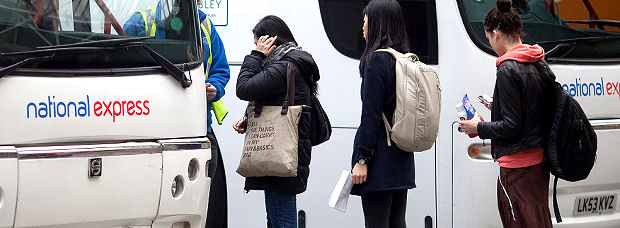Young people ditch car for train and coach discounts
As a record number of young people buy annual cards for cheap coach and train travel amid rising motoring costs and tuition fees, car insurers deny they are pricing students off the road.

Last year more than 1.2 million young people had railcards entitling them to one third off rail travel in Britain – up by almost 30 per cent from the number who had a railcard in 2005, according to figures from the Association of Train Operating Companies (ATOC).
On average, young people with a railcard, which costs £28 per year, save £159 a year year on rail travel and make around 40 journeys, ATOC says.
Sales in discount cards for coaches have also jumped. Last year National Express, Britain’s largest coach operator, reported a 36 per cent increase in sales of coach and regional bus discount cards from the previous year.
16- to 25-year-olds have been quick to see train travel as an affordable, reliable alternative to a car. Edward Welsh, ATOC spokesperson
Train companies say the increase in railcards is due a combination of factors including an increase in the price of car insurance premiums for young drivers, a rise in fuel costs, and a rise in university tution fees to up to £9,000.
Edward Welsh, a spokesperson for ATOC, said: “Getting a car on your seventeenth birthday is no longer a familiar rite of passage for a growing number of young people. We know a lot of under 25-year-olds are struggling to afford the costs of buying, running and insuring a car – and that’s on top of paying for driving lessons.
“A generation of 16- to 25-year -olds has been quick to see train travel as an affordable, reliable alternative to a car that has the added bonus of never having to worry about asking mates to chip in with petrol money.”
Driving Test Dip
Almost 250,000 fewer 17-to 25-year-olds took their driving test last year than in 2005 – an 18 per cent drop, Driving Standards Agency figures show.
Rising fuel prices have made owning a car more expensive, but experts say the biggest financial headache for young drivers has been a sharp rise in motor insurance premiums. The average premium for women aged between 17 and 22 is around £1,800 and for young men it is around £3,100, according to figures from vehicle breakdown company AA.
However, James Dalton, assistant director of motor at the Association of British Insurers, denied that insurers were unfairly penalising young drivers.
One in five young drivers will crash in the first six months after passing their test. James Dalton, Association of British Insurers
He told Channel 4 News that young drivers’ premiums reflect the higher risk that they pose. “Young drivers aged 17 to 24 account for 12 per cent of licence holders but make up 25 per cent of all road accidents where someone is injured,” he said. “One in five young drivers will crash in the first six months after passing their test, and the crash risk for young drivers is nearly three times higher when carrying three or more passengers.”
He advised young drivers to shop around and consider new “black box”insurance policies – boxes installed in cars which use satellite technology to track driver performance including speed and breaking, which can potentially reduce premiums.
Mr Dalton added that the cost of motor insurance for young people could also be reduced if the government introduced a minimum time period drivers should learn for before taking their test and a zero alcohol limit for young drivers.
Pete Mercer, vice-president, welfare, at the National Union of Students, told Channel 4 News that as living costs for students increase it was “vitally important” that reliable public transport remained affordable for students.
-
Latest news
-
Mark Menzies: is UK politics full of scandal?33m

-
Windrush scandal: returning to the UK after a forty year wait6m

-
Netanyahu ‘survival’ depends on ‘expanding war’ says head of Palestinian National Initiative5m

-
Proposed law change could strip parental rights from paedophiles5m

-
Hugh Grant settles privacy lawsuit against The Sun newspaper publisher2m

-




